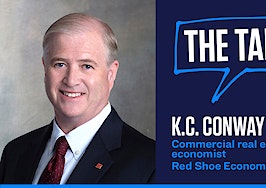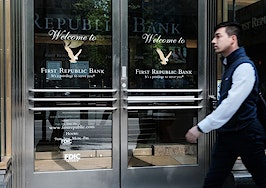In these times, double down — on your skills, on your knowledge, on you. Join us Aug. 8-10 at Inman Connect Las Vegas to lean into the shift and learn from the best. Get your ticket now for the best price.
Seattle-based regional bank HomeStreet Inc. is reportedly up for sale after customers pulled more than $260 million in deposits during the second quarter.
HomeStreet is also considering raising capital and selling assets and could opt to remain independent, Bloomberg News reported this week, citing anonymous sources.
Regional banks have largely weathered the crisis fueled by this year’s failures of Silicon Valley Bank, Signature Bank and First Republic Bank by pursuing mergers and by boosting deposits through third-party brokers.
A planned merger of PacWest Bancorp and Banc of California announced last week “takes the last bank of size that had been weakened since March off the chess board, which we view as healthy for the industry overall,” UBS analyst Brody Preston wrote in a note to clients cited by Bloomberg.
Another regional lender whose share price was hammered in May by fears of a run on deposits, Western Alliance Bancorp, is one of a number of banks that’s shored up deposits through third-party brokers like Morgan Stanley or Fidelity, the Wall Street Journal reports.
Shares in Western Alliance, which have traded for as much as $86.87 and as little as $7.46 in the last year, have been recovering since bottoming in May and are trading above $50 this month. On July 18, Western Alliance reported a $216 million second-quarter profit and said deposits were up 7.3 percent to $51 billion.
In ratcheting up interest rates to fight inflation, the Federal Reserve has raised the cost of funding for banks, because customers expect better returns on their deposits. Although banks can eventually pay consumers better returns by charging higher rates on their loans, many had already invested their depositors’ money in long-term Treasurys that they were forced to sell at a loss.
Not only did customers hunting for better rates start withdrawing their funds from regional banks, but fears that some banks might become insolvent started a run on “uninsured deposits” exceeding the $250,000 maximum insured by the Federal Deposit Insurance Corp (FDIC).
Although federal regulators quickly announced a “systemic risk exception” to fully protect all deposits at Silicon Valley Bank and Signature Bank, maintaining uninsured deposits remains challenging for some banks.
In reporting a $31.4 million second-quarter loss last week, HomeStreet said its uninsured deposits dropped from $1 billion as of March 31 to $495 million as of June 30. Some of the drop was due to customers shifting to other products within HomeStreet that provide full FDIC coverage. But excluding brokered deposits, HomeStreet said total deposits were down $262 million from the first quarter to $5.9 billion.
“Our operating results for the quarter reflect the continuing adverse impact of the historically record velocity and magnitude of increases in short-term interest rates,” HomeStreet CEO Mark K. Mason said in a statement. “To mitigate these challenges, we have reduced our new loan originations and the size of our loan and securities portfolios, raised new deposits through promotional products and reduced the level of uninsured deposits to 7 percent of total deposits primarily through products which provide complete FDIC deposit insurance coverage.”
HomeStreet has also focused new loan origination activity “primarily on floating rate products, such as commercial loans, residential construction loans and home equity loans,” Mason said.
Shares in HomeStreet, which have traded for as little as $4.76 and as much as $38.30 over the last year, initially plunged after Bloomberg reported after markets closed Monday that the bank might be up for sale. But shares have since rebounded from a Wednesday low of $8.44, closing at $10.55 Thursday.
Blue Lion Capital, a Dallas-based investment firm that holds a 2 percent stake in HomeStreet, said Thursday that rather than selling itself, HomeStreet could sell the license it holds to make loans to multifamily homebuilders backed by Fannie Mae.
Blue Lion estimates the sale of HomeStreet’s Fannie Mae Delegated Underwriting and Servicing (DUS) license could generate $100 million to $150 million in proceeds, allowing HomeStreet to “transform its balance sheet and remove viability concerns.”
“In 2022, the [Fannie Mae multifamily lending program] generated more than $69 billion of loans and approximately $2 billion of gain on sale fees,” Blue Lion said in making its case to HomeStreet shareholders. “In short, the [Fannie Mae] DUS program is very large, there are only 25 licenses and the gain on sale fees are 2-3 times larger than non-guaranteed multifamily loan sale fees.”
With $135 million in 2022 loan sales, HomeStreet is the smallest Fannie Mae DUS lender, Blue Lion said, “and there are several large banks that do not have a license. It goes without saying that in the CRE multifamily lending business, size matters.”
A HomeStreet spokesperson did not immediately respond to a request for comment on reports that the bank is up for sale or on calls for it to sell its Fannie Mae DUS license.
Get Inman’s Mortgage Brief Newsletter delivered right to your inbox. A weekly roundup of all the biggest news in the world of mortgages and closings delivered every Wednesday. Click here to subscribe.













